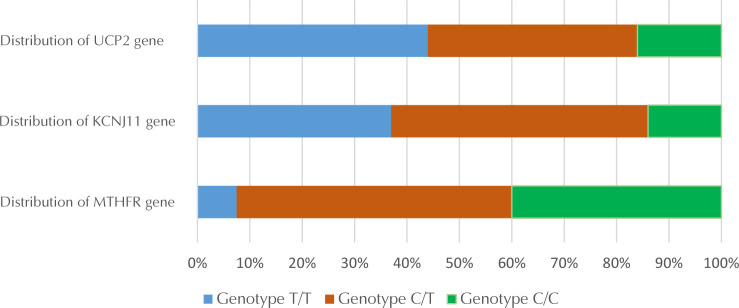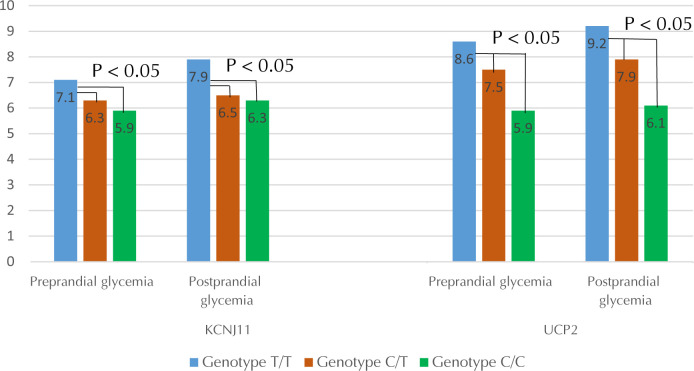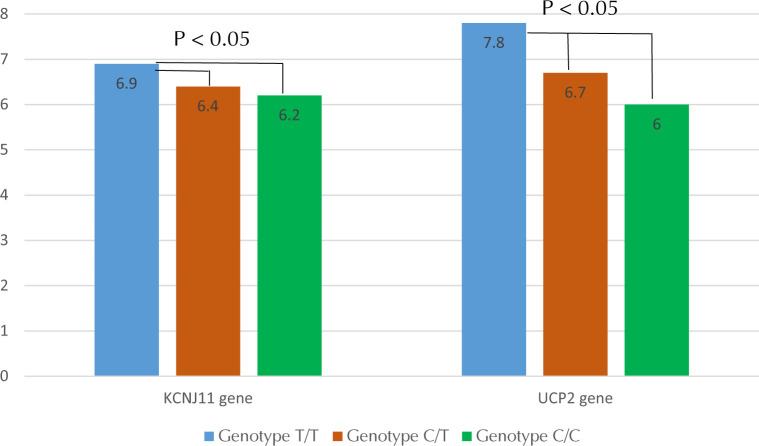KCNJ11 rss5219、UCP2 rs659366和MTHFR rs1801133多态性对2型糖尿病的影响:一项横断面研究
Q3 Medicine
引用次数: 0
摘要
目的:2型糖尿病(T2D)是一种多因素疾病。其发生及预后受多种基因影响,包括KCNJ11、UCP2、MTHFR等。本研究的目的是调查这些基因的各种变体的分布,并评估它们对T2D结果的贡献。方法:对80例40-65岁的女性t2dm和I-II型肥胖患者进行了基因研究、血液生化检查和间接量热测定。结果:MTHFR基因C/T和T/T基因型携带者胆固醇和甘油三酯水平较高,维生素B6和叶酸水平较低。UCP2基因的T/T基因型与较高的糖化血红蛋白水平、餐前和餐后血糖和脂质氧化率、较低的碳水化合物氧化和较低的血清维生素C水平相关。结论:基因分型UCP2和KCNJ11可能有助于选择最佳的降糖治疗和改善疾病预后,而MTHFR基因可能决定是否需要监测B族维生素状态和血脂异常的风险。本文章由计算机程序翻译,如有差异,请以英文原文为准。



Impact of KCNJ11 rs5219, UCP2 rs659366, and MTHFR rs1801133 Polymorphisms on Type 2 Diabetes: A Cross-Sectional Study.
OBJECTIVE Type 2 diabetes (T2D) is a multifactorial disease. Its occurrence and prognosis are affected by many genes, including KCNJ11, UCP2, and MTHFR. The objective of this study was to investigate the distribution of various variants of these genes and evaluate their contribution to the outcome of T2D. METHODS 80 females with T2D and class I-II obesity in the age of 40-65 years old underwent a genetic study, a biochemical blood test, and indirect calorimetry. RESULTS Carriers of C/T and T/T genotypes of the MTHFR gene had higher levels of cholesterol and triglycerides and lower levels of vitamin B6 and folate. The T/T genotype of the UCP2 gene was associated with higher levels of glycated hemoglobin, pre- and postprandial glycemia and lipid oxidation rate, lower carbohydrate oxidation, and lower serum vitamin C levels. CONCLUSIONS Genotyping UCP2 and probably KCNJ11 may help to select the optimal antidiabetic therapy and improve disease prognosis, whereas the MTHFR gene may determine the need to monitor group B vitamin status and the risk of dyslipidemia.
求助全文
通过发布文献求助,成功后即可免费获取论文全文。
去求助
来源期刊

Review of Diabetic Studies
Medicine-Internal Medicine
CiteScore
1.80
自引率
0.00%
发文量
28
期刊介绍:
The Review of Diabetic Studies (RDS) is the society"s peer-reviewed journal published quarterly. The purpose of The RDS is to support and encourage research in biomedical diabetes-related science including areas such as endocrinology, immunology, epidemiology, genetics, cell-based research, developmental research, bioengineering and disease management.
 求助内容:
求助内容: 应助结果提醒方式:
应助结果提醒方式:


